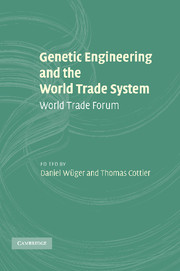Book contents
- Frontmatter
- Contents
- List of contributors
- List of abbreviations
- PART I Introduction and systemic issues
- PART II Intellectual property and gene technology: issues at stake and possible options
- PART III Food security, trade and agricultural production with genetically modified organisms
- 7 Biotechnology in the energy sector: some implications for developing countries
- 8 Coexistence and liability: implications for international trade drawn from the Swiss example
- 9 Food security and agricultural production with genetically modified organisms: a comment
- PART IV Food safety, international trade and biotechnology
- PART V Medical research, cloning and international trade
- Index
9 - Food security and agricultural production with genetically modified organisms: a comment
Published online by Cambridge University Press: 06 October 2009
- Frontmatter
- Contents
- List of contributors
- List of abbreviations
- PART I Introduction and systemic issues
- PART II Intellectual property and gene technology: issues at stake and possible options
- PART III Food security, trade and agricultural production with genetically modified organisms
- 7 Biotechnology in the energy sector: some implications for developing countries
- 8 Coexistence and liability: implications for international trade drawn from the Swiss example
- 9 Food security and agricultural production with genetically modified organisms: a comment
- PART IV Food safety, international trade and biotechnology
- PART V Medical research, cloning and international trade
- Index
Summary
What is at stake?
The purpose of this forum was to explore how the law can contribute to making biotechnology a benefit to humankind and not a curse. In their articles, Philippe Cullet, Anne Petitpierre-Sauvain and Constance Wagner explain the different aspects that have to be taken into account when attempting to develop a comprehensive strategy for considering the issues at stake when exploring how genetically modified organisms (GMOs) can contribute to (or endanger) food security. My brief remarks draw on these contributions and outline some aspects I consider relevant to further work on the topic.
The term food security has two interrelated connotations. First, it describes the factual situation of having sufficient food and water available, even in times of hardship. This is a worthwhile policy goal for poor and rich countries alike: while the latter grapple with too many calories, rather than too few, environmental and political changes may diminish today's abundance. Secondly, food security is also used as shorthand for the obligation to make every effort to cause famine to disappear and to ensure that every person has sufficient nourishment at his or her disposal. While ethical in origin, this obligation has now entered the legal realm: its most prominent manifestation can be found in Article 11 of the International Covenant on Economic, Social and Cultural Rights (ICESCR), which enshrines the right to food and the right to be free from hunger: the contracting parties undertake to respect, protect and fulfil the right to food.
- Type
- Chapter
- Information
- Genetic Engineering and the World Trade SystemWorld Trade Forum, pp. 193 - 202Publisher: Cambridge University PressPrint publication year: 2008

